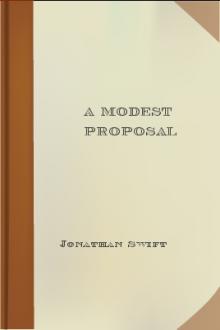The Devil's Dictionary by Ambrose Bierce (good novels to read in english TXT) 📗

- Author: Ambrose Bierce
Book online «The Devil's Dictionary by Ambrose Bierce (good novels to read in english TXT) 📗». Author Ambrose Bierce
Gat Huckle
EXECUTIVE, n. An officer of the Government, whose duty it is to enforce the wishes of the legislative power until such time as the judicial department shall be pleased to pronounce them invalid and of no effect. Following is an extract from an old book entitled, The Lunarian Astonished—Pfeiffer & Co., Boston, 1803:
LUNARIAN: Then when your Congress has passed a law it goes directly to the Supreme Court in order that it may at once be known whether it is constitutional? TERRESTRIAN: O no; it does not require the approval of the Supreme Court until having perhaps been enforced for many years somebody objects to its operation against himself—I mean his client. The President, if he approves it, begins to execute it at once. LUNARIAN: Ah, the executive power is a part of the legislative. Do your policemen also have to approve the local ordinances that they enforce? TERRESTRIAN: Not yet—at least not in their character of constables. Generally speaking, though, all laws require the approval of those whom they are intended to restrain. LUNARIAN: I see. The death warrant is not valid until signed by the murderer. TERRESTRIAN: My friend, you put it too strongly; we are not so consistent. LUNARIAN: But this system of maintaining an expensive judicial machinery to pass upon the validity of laws only after they have long been executed, and then only when brought before the court by some private person—does it not cause great confusion? TERRESTRIAN: It does. LUNARIAN: Why then should not your laws, previously to being executed, be validated, not by the signature of your President, but by that of the Chief Justice of the Supreme Court? TERRESTRIAN: There is no precedent for any such course. LUNARIAN: Precedent. What is that? TERRESTRIAN: It has been defined by five hundred lawyers in three volumes each. So how can any one know?EXHORT, v.t. In religious affairs, to put the conscience of another upon the spit and roast it to a nut-brown discomfort.
EXILE, n. One who serves his country by residing abroad, yet is not an ambassador.
An English sea-captain being asked if he had read "The Exile of Erin," replied: "No, sir, but I should like to anchor on it." Years afterwards, when he had been hanged as a pirate after a career of unparalleled atrocities, the following memorandum was found in the ship's log that he had kept at the time of his reply:
Aug. 3d, 1842. Made a joke on the ex-Isle of Erin. Coldly received. War with the whole world!EXISTENCE, n.
A transient, horrible, fantastic dream, Wherein is nothing yet all things do seem: From which we're wakened by a friendly nudge Of our bedfellow Death, and cry: "O fudge!"EXPERIENCE, n. The wisdom that enables us to recognize as an undesirable old acquaintance the folly that we have already embraced.
To one who, journeying through night and fog, Is mired neck-deep in an unwholesome bog, Experience, like the rising of the dawn, Reveals the path that he should not have gone.Joel Frad Bink
EXPOSTULATION, n. One of the many methods by which fools prefer to lose their friends.
EXTINCTION, n. The raw material out of which theology created the future state.
FAIRY, n. A creature, variously fashioned and endowed, that formerly inhabited the meadows and forests. It was nocturnal in its habits, and somewhat addicted to dancing and the theft of children. The fairies are now believed by naturalists to be extinct, though a clergyman of the Church of England saw three near Colchester as lately as 1855, while passing through a park after dining with the lord of the manor. The sight greatly staggered him, and he was so affected that his account of it was incoherent. In the year 1807 a troop of fairies visited a wood near Aix and carried off the daughter of a peasant, who had been seen to enter it with a bundle of clothing. The son of a wealthy bourgeois disappeared about the same time, but afterward returned. He had seen the abduction and been in pursuit of the fairies. Justinian Gaux, a writer of the fourteenth century, avers that so great is the fairies' power of transformation that he saw one change itself into two opposing armies and fight a battle with great slaughter, and that the next day, after it had resumed its original shape and gone away, there were seven hundred bodies of the slain which the villagers had to bury. He does not say if any of the wounded recovered. In the time of Henry III, of England, a law was made which prescribed the death penalty for "Kyllynge, wowndynge, or mamynge" a fairy, and it was universally respected.
FAITH, n. Belief without evidence in what is told by one who speaks without knowledge, of things without parallel.
FAMOUS, adj. Conspicuously miserable.
Done to a turn on the iron, behold Him who to be famous aspired. Content? Well, his grill has a plating of gold, And his twistings are greatly admired.Hassan Brubuddy
FASHION, n. A despot whom the wise ridicule and obey.
A king there was who lost an eye In some excess of passion; And straight his courtiers all did try To follow the new fashion. Each dropped one eyelid when before The throne he ventured, thinking 'Twould please the king. That monarch swore He'd slay them all for winking. What should they do? They were not hot To hazard such disaster; They dared not close an eye—dared not See better than their master. Seeing them lacrymose and glum, A leech consoled the weepers: He spread small rags with liquid gum And covered half their peepers. The court all wore the stuff, the flame Of royal anger dying. That's how court-plaster got its name Unless I'm greatly lying.Naramy Oof
FEAST, n. A festival. A religious celebration usually signalized by gluttony and drunkenness, frequently in honor of some holy person distinguished for abstemiousness. In the Roman Catholic Church feasts are "movable" and "immovable," but the celebrants are uniformly immovable until they are full. In their earliest development these entertainments took the form of feasts for the dead; such were held by the Greeks, under the name Nemeseia, by the Aztecs and Peruvians, as in modern times they are popular with the Chinese; though it is believed that the ancient dead, like the modern, were light eaters. Among the many feasts of the Romans was the Novemdiale, which was held, according to Livy, whenever stones fell from heaven.
FELON, n. A person of greater enterprise than discretion, who in embracing an opportunity has formed an unfortunate attachment.
FEMALE, n. One of the opposing, or unfair, sex.
The Maker, at Creation's birth, With living things had stocked the earth. From elephants to bats and snails, They all were good, for all were males. But when the Devil came and saw He said: "By Thine eternal law Of growth, maturity, decay, These all must quickly pass away And leave untenanted the earth Unless Thou dost establish birth"— Then tucked his head beneath his wing To laugh—he had no sleeve—the thing With deviltry did so accord, That he'd suggested to the Lord. The Master pondered this advice, Then shook and threw the fateful dice Wherewith all matters here below Are ordered, and observed the throw; Then bent His head in awful state, Confirming the decree of Fate. From every part of earth anew The conscious dust consenting flew, While rivers from their courses rolled To make it plastic for the mould. Enough collected




Comments (0)